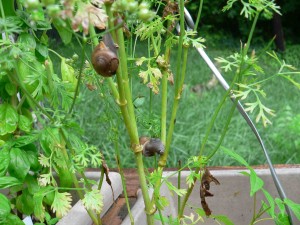I try to grow my own cilantro, but the birds and cats and skinks find it yummy.
So there’s not much left.
 And this is why I’m not a farmer.
And this is why I’m not a farmer.
As the Cyclospora count in Texas reached 203, some Mexican cilantro is being banned in the U.S. after health officials found human feces and toilet paper in growing fields from which herbs have been linked to hundreds of intestinal illnesses among Americans dating back to 2012.d
The Food and Drug Administration will detain Mexican cilantro at the border from April to August and won’t allow products from the state of Puebla, Mexico, into the U.S. without inspections and certification, according to an import ban dated Monday by the agency. Cilantro from other parts of Mexico will need documentation to prove the product isn’t from Puebla, about a two-hour drive southeast of Mexico City.
The cilantro is linked to outbreaks of cyclosporiasis, according to the alert. Last year, at
Since 2013, the FDA and Mexican authorities have inspected 11 farms and packing houses that produce cilantro from Puebla. At eight, health officials found bathrooms without soap, toilet paper or running water, in addition to the human feces and toilet paper in growing fields. Some had a complete lack of toilet facilities.
“Based on those joint investigations, FDA considers that the most likely routes of contamination of fresh cilantro are contact with the parasite shed from the intestinal tract of humans affecting the growing fields, harvesting, processing or packing activities or contamination with the parasite through contaminated irrigation water, contaminated crop protectant sprays, or contaminated wash waters,” the alert said.
A 2013 cyclosporiasis outbreak in 25 states was linked to Puebla cilantro as well as salad mix from Taylor Farms de Mexico that was sold to Olive Garden and Red Lobster, both then owned by Darden Restaurants Inc. The FDA and Mexican officials found conditions at Taylor Farms de Mexico in Guanajuato met food safety protocols, the FDA said.
